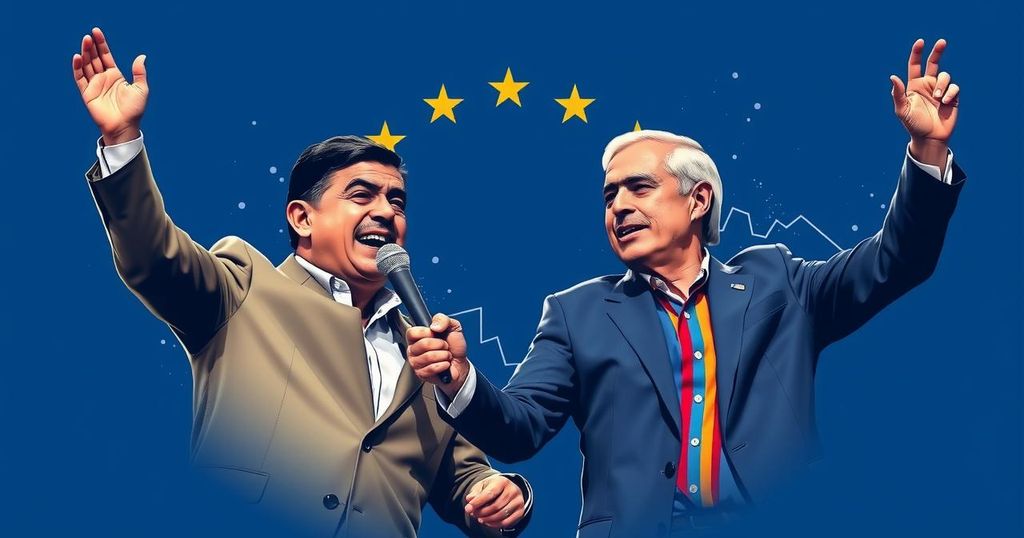Uruguay’s presidential runoff features Álvaro Delgado of the National Party against Yamandú Orsi of the Broad Front amidst a contentious electoral landscape focused on rising crime and economic inequality. Initial voting indicated a close race, with polls showing a near tie. Both candidates appeal to concerns about public safety and economic policies, underscoring the need for collaborative governance given the parliamentary balance.
Uruguayans participated in a pivotal second round of presidential voting on Sunday, as the conservative governing party squares off against the left-wing Broad Front in a strongly contested runoff. Álvaro Delgado, representing the incumbent party, is competing against Yamandú Orsi, who hails from a coalition that led the nation for 15 years until the 2019 elections. This election marks a significant departure from past trends; it presents a challenging race with the candidates appealing to voter concerns over increasing violent crime and economic inequality.
In the initial round of voting on October 27, the Broad Front secured 44% of the votes, while Delgado’s National Party garnered 27%. Additionally, conservative parties that constitute the government coalition collectively received 20% of the total, granting Delgado a potential advantage. Current polling indicates a statistical tie between the two candidates, with about 10% of the electorate still undecided as election day approached.
Despite the candidates having similar platforms on key issues, their campaigns have faced criticism for being uninspiring, resulting in widespread voter apathy. Analysts have noted that the electoral climate lacks the populist fervor commonly observed in other countries. Nicolás Saldías, a senior analyst, remarked, “The question of whether Frente Amplio raises taxes is not an existential question… That doesn’t exist in Uruguay.”
Both candidates are addressing rising public anxiety surrounding crime. Delgado proposes stringent crime policies and the construction of a maximum-security facility, while Orsi advocates for community-focused crime prevention strategies. Delgado, 55, aims to carry forward the successful policies of President Luis Lacalle Pou, emphasizing a platform that touts continuity. Conversely, Orsi, 57, builds upon the legacy of former President José Mujica with a proposed approach that balances progressive social policies with fiscal responsibility.
Amidst varying perspectives on taxation and social reforms, both candidates are committed to adapting to Uruguay’s evolving political landscape, which necessitates negotiation within the parliamentary structure. Notably, a recent plebiscite on enhancing pension payouts was rejected, reflecting the electorate’s preference for fiscal discipline over expansive social benefits.
This election exemplifies Uruguay’s democratic maturity, characterized by reasoned dialogue rather than populist outrage. Saldías characterized the election as, “a normal election, which is rare,” highlighting Uruguay’s stable democratic tradition amidst broader regional challenges.
Uruguay’s recent presidential elections have transitioned from what was initially perceived as a lackluster political affair to a contentious and closely fought contest. With a population of 3.4 million, Uruguay has notable distinctions in its social policies, having previously legalized abortion, same-sex marriage, and marijuana sales under the Broad Front’s governance. The upcoming runoff pits the current conservative administration against the left-leaning Broad Front, which seeks to reclaim power. Rising crime rates and income inequality are prominent issues during the campaign, compelling candidates to address citizen concerns deliberately. Additionally, the electoral environment is marked by a lack of extreme partisanship, contrasting sharply with the political upheaval seen in several other nations.
The ongoing presidential runoff in Uruguay reflects significant voter engagement, pitting incumbent Álvaro Delgado against challenger Yamandú Orsi in a race centered on pressing issues like crime and economic stability. Despite their differing backgrounds and proposed policies, both candidates acknowledge the need for collaborative governance, given the evenly split Congress. As Uruguay navigates these electoral dynamics, the outcome will likely shape the nation’s socio-economic landscape moving forward, continuing its tradition of democratic resilience amidst evolving political challenges.
Original Source: www.voanews.com






